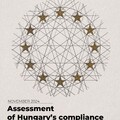The Hungarian government is actively engaging with the European Commission to secure the release of European Union funds withheld due to concerns about systemic corruption. Simultaneously, it once again introduced legislation that weakens the country’s anti-corruption framework. In December 2023 it introduced legislation that further reduced the transparency of public funds. The amendments, coming into force this year, may be interpreted as a response to successful litigation by CSOs and journalists.

Palace of Justice, Budapest. Photo: Molnár Noémi Fanni
Further Burdens on Transparency
In 2021, Transparency International Hungary submitted a Freedom of Information (FOI) request in order to receive information regarding the government's excessive expenditure on ventilators procured unnecessarily during the Covid pandemic. The Ministry declined to release the requested data, citing the necessity of obtaining it from subordinate entities. This rationale was rejected by both the first instance court and the court of appeal, compelling the Ministry to appeal to the highest court of Hungary, the Kúria.
The Kúria dismissed the Ministry's arguments and decided that the data should indeed be disclosed. In its reasoning, the highest court emphasized that the fulfillment of FOI requests constitutes a legitimate expectation, particularly when pertaining to a ministry staffed by professionals.
‘A defendant with a professional apparatus (...) cannot plead on any ground that it is unable to obtain or collect the information of public interest requested from the organizations under its control, or this would cause it particular difficulties.’ (Kúria's decision No. Pfv.20.278/2023/6.)
The Government's amendment to the pertinent section of the Freedom of Information Act seems to be a response to the ruling issued by the Kúria. As per the amendment, information that could otherwise be directly obtained from a single (subordinate) entity has longer to be delivered to the requesting party. Henceforth, citizens are compelled to individually approach and, if necessary, engage in legal proceedings with various entities, even if the sought-after data could reasonably be procured from a single body with control or oversight over multiple others.
Furthermore, the amendment explicitly clarifies that a FOI request may be denied, if it entails the creation of so-called new data. This aligns with established case law The determination of what constitutes "new data" in a specific instance will continue to be a matter adjudicated by the courts, provided that the party requesting the data is able to dedicate the necessary time and financial resources to litigate.
Powers of The Transparency Authority Expanded
Public entities are mandated to maintain records of received FOI requests including the reasons for rejection and report on these annually to the Authority. Under the amended regulations, public bodies are now only obligated to report the main grounds for rejecting FOI requests to the Authority. Additionally, they must provide data on the average processing time for FOI requests and links to the disclosed information.
To facilitate this reporting process, the Authority has devised a form for public bodies to furnish detailed information on their handling of FOI requests. This form offers greater specificity compared to the vague wording of the new law. However, it is important to note that the information submitted is purely of a statistical nature, and the specific cases themselves remain likely undisclosed to the Authority.
Furthermore, the Authority will be tasked with conducting assessments of public bodies' compliance with proactive disclosure rules twice a year, or even upon a request, with the possibility of issuing recommendations to the entities under review. In response to these recommendations, the respective heads of the bodies concerned will be obligated to formulate an action plan addressing the identified issues and submit it to the Authority within 15 days of receiving the recommendations.
It is worth highlighting that the Authority has possessed similar oversight powers in the past. Notably, the Authority retains its inability to oblige public bodies to disclose data, and it lacks the authority to impose fines in cases where public bodies fail to adhere to the FOI Act. The novel aspect is the Authority's increased responsibility of conducting regular checks on public bodies. However, it remains unclear whether this expanded powers has been accompanied by an increase in the Authority’s staff.
Less Transparency In The Government
The Hungarian Government categorizes government decrees into three distinct groups based on the degree of confidentiality associated with the decisions. The initial category comprises public decisions, commonly referred to as "one-thousand decisions" due to their numbering beginning at 1000. However, there exist certain decisions intentionally withheld from publication or designated as classified information. These fall into the categories of "two-thousand decisions" and "three-thousand decisions." The former is non-public but lacks classified information, whereas the latter, starting with "three thousand," is explicitly classified and encompasses state secrets.
In 2023, journalist Tibor Lengyel from the Hungarian news outlet HVG and in two other cases K-Monitor took legal action against the Prime Minister's Office to gain access to decisions categorized under the "two-thousand" numbering system.
K-Monitor aimed at obtaining government decisions made between 2010 and 2012 that fall in this category, and in another case it sought the disclosure of the amount of public funds expended on newly established public interest trusts. In all three legal proceedings, the court ruled in favor of disclosing the government decisions.
In response to the decisions, the Government made amendments to the Government Administration Act, which outlines the fundamental rules of government operations.
Starting from March 2024, different rules will apply to the documentation of government meetings. Under the new guidelines, if the government is of the view that disclosing a government decision would compromise the public interest, it must deny disclosure, but this denial can only be in effect until the public interest is no longer jeopardized, with an absolute maximum time frame of twenty years. Prior to making this decision, consideration shall be given to whether the public interest protected by withholding the information overrides the public interest served by making the information publicly available.
These FOI requests will be decided by the state secretary of the Prime Minister's Office. In cases where deemed necessary, the opinion of the competent Minister must be solicited. The Minister is obliged to provide theirconsideration on the public interest at stake within a 15-day period. It's important to note that this timeframe does not factor into the general 15-day response time, meaning that until the Minister offers their opinion, no substantive response will be issued to the citizen. Consequently, this opens the door for the secretary of state to potentially exploit the minister's involvement to the detriment of the individual seeking the data. Until the Minister's opinion is obtained, the deadline for responding to the request will not expire.
Furthermore, what is new in this amendment is the extended duration for non-disclosure, which now stands at 20 years, as opposed to the previous period of 10 years. In contrast to 2023, where the government could not automatically assert that a government decision from 2012 was preparatory data, in 2024, it will have the authority to make such a claim. This has relevance as the 10 years timeframe would have allowed journalists and researchers to explore the first years of the Orban government in more detail.
Less Transparent State Owned Companies
The government has additionally introduced amendments to the legislation governing publicly owned companies. Going forward, FOI requests directed at state or municipal enterprises must be denied for a period of 10 years if the release of data bearing financial, technical, or business significance could potentially harm foreign policy interests. Similar to the mentioned government decisions, the consideration of the public interest remains a requirement, but the involvement of the minister's opinion will be obligatory in all cases. The time frame for responding to such requests does not encompass the duration required to obtain the Minister's opinion, which means that citizens may experience delays in receiving information regarding the status of their data request.
This amendment could pertain to matters related to the confidentiality of contracts involving Hungarian Railways’ joint project with China or other foreign entities, such as the recently announced Maxi-Dubai project. Furthermore they could be applied to make government decisions confidential that aim to foster the establishment of new battery factories by Asian investors.
While the Hungarian Government has pledged to fulfill a set of transparency measures under the conditionality mechanism, the newly enacted laws do not appear to reflect a genuine dedication to transparency.
K-Monitor’s Freedom of Information report has revealed that the new rules on proactive disclosure do not apply to numerous entities utilizing public funds. Furthermore, some of the introduced changes to lawsuits could potentially prove disadvantageous to citizens too. The new amendments, that take effect in 2024, seem to follow a similar trajectory in terms of approach.
This is an updated version of a blog post published last week
Címkék: english
Szólj hozzá!
A bejegyzés trackback címe:
Kommentek:
A hozzászólások a vonatkozó jogszabályok értelmében felhasználói tartalomnak minősülnek, értük a szolgáltatás technikai üzemeltetője semmilyen felelősséget nem vállal, azokat nem ellenőrzi. Kifogás esetén forduljon a blog szerkesztőjéhez. Részletek a Felhasználási feltételekben és az adatvédelmi tájékoztatóban.





